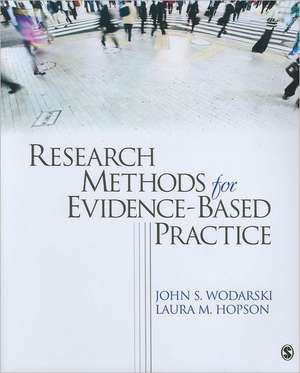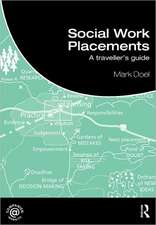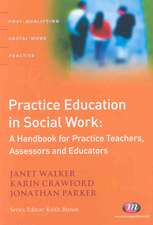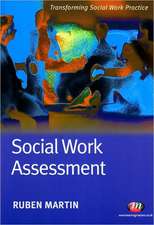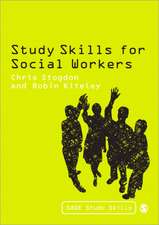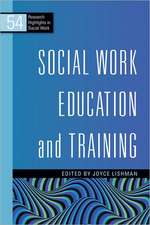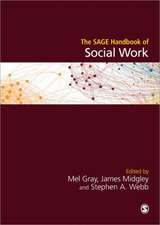Research Methods for Evidence-Based Practice: Evidence-Based Practice in Social Work
Autor John S. Wodarski, Laura Hopsonen Limba Engleză Paperback – 12 dec 2011
Preț: 977.29 lei
Preț vechi: 1338.75 lei
-27% Nou
Puncte Express: 1466
Preț estimativ în valută:
186.100€ • 195.24$ • 154.77£
186.100€ • 195.24$ • 154.77£
Carte tipărită la comandă
Livrare economică 04-18 aprilie
Preluare comenzi: 021 569.72.76
Specificații
ISBN-13: 9781412990981
ISBN-10: 141299098X
Pagini: 192
Dimensiuni: 187 x 232 x 15 mm
Greutate: 0.3 kg
Ediția:1
Editura: SAGE Publications
Colecția Sage Publications, Inc
Seria Evidence-Based Practice in Social Work
Locul publicării:Thousand Oaks, United States
ISBN-10: 141299098X
Pagini: 192
Dimensiuni: 187 x 232 x 15 mm
Greutate: 0.3 kg
Ediția:1
Editura: SAGE Publications
Colecția Sage Publications, Inc
Seria Evidence-Based Practice in Social Work
Locul publicării:Thousand Oaks, United States
Recenzii
“The text addresses important current issues and provides a “how to” guide for students to evaluate and translate research findings into practice. This is a very crucial, fundamentally important work that discusses the relevance and steps to making EBP (evidence-based practice) a reality for helping professionals. The language is easy to read and the approach is practical, organized, and almost intuitive approach to the content. Students will find the book easy to read compared to the traditional research textbooks. This practice approach enhances the attractiveness of the book as a supplementary text to major research textbooks.”
“The greatest strength in the proposed text is the text takes the use of evidence-based practice in social work to the next level, namely, identifying the components and areas that need to be focused on. I believe there is a need for a text that walks people through the various stages of implementing evidence based practice, providing the rational and examples of how to accomplish the implementation, and sustainability of using evidence-based practice. All too often, students leave “the need for research” behind once they have completed the course. This text emphasizes the continued need to stay informed on new developments, and techniques in the social work field.”
“The text enables students to understand how to become an evidence-based practitioner – this is an important part of training students as practitioners.”
“The greatest strength in the proposed text is the text takes the use of evidence-based practice in social work to the next level, namely, identifying the components and areas that need to be focused on. I believe there is a need for a text that walks people through the various stages of implementing evidence based practice, providing the rational and examples of how to accomplish the implementation, and sustainability of using evidence-based practice. All too often, students leave “the need for research” behind once they have completed the course. This text emphasizes the continued need to stay informed on new developments, and techniques in the social work field.”
“The text enables students to understand how to become an evidence-based practitioner – this is an important part of training students as practitioners.”
Cuprins
Preface
1. Evidence-Based Practice: An Introduction
2. Criteria for Choosing Knowledge and Assessing Evidence-Based Intervention
3. Transforming Behavioral Science Knowledge into Practie Generalizations
4. Planning for Conducting Research in Community Agencies
5. Choice-of-Outcome Measures and Means for Assessment
6. Traditional Designs
7. Designs for Daily Practice Evaluation
8. Application of Statistical Techniques in the Evaluation of Practice
9. Advanced Statistical Techniques in Social Work Research
10. Development and Use of Management Information Systems for Human Services: A Practical Guide
11. Developing and Formulating Quality Proposals
12. Emerging Trends and Issues Related to Evidence-Based Practice
Index
1. Evidence-Based Practice: An Introduction
2. Criteria for Choosing Knowledge and Assessing Evidence-Based Intervention
3. Transforming Behavioral Science Knowledge into Practie Generalizations
4. Planning for Conducting Research in Community Agencies
5. Choice-of-Outcome Measures and Means for Assessment
6. Traditional Designs
7. Designs for Daily Practice Evaluation
8. Application of Statistical Techniques in the Evaluation of Practice
9. Advanced Statistical Techniques in Social Work Research
10. Development and Use of Management Information Systems for Human Services: A Practical Guide
11. Developing and Formulating Quality Proposals
12. Emerging Trends and Issues Related to Evidence-Based Practice
Index
Notă biografică
Descriere
A practical and student-friendly text which offers students an enhanced understanding of the research process, and equips them with the necessary tools and skills to evaluate studies, translate relevant behavioral science knowledge into practice principles, and implement evaluation procedures in their daily practice.
